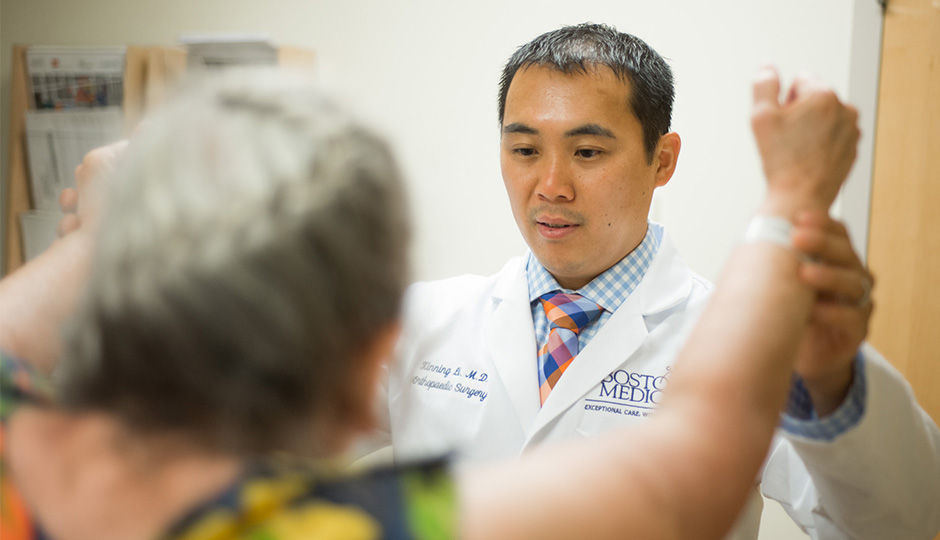Shoulder Pain—When Surgery May Be Your Best Option
Shoulder pain is a common muscular complaint, which can arise at any age and for a variety of reasons. It is a common overuse injury in athletes, particularly those who participate in throwing and overhead sports, such as swimming, tennis, golf and baseball. Shoulder pain can also occur after trauma when the shoulder dislocates or in the aging population for reasons such as arthritis and rotator cuff tears.
It is particularly distressing for athletes and non-athletes alike when they can’t participate in their sport; or even perform basic activities like showering, taking an object off a shelf, grocery shopping, driving, and picking up a child.
If you have been suffering with shoulder pain due to overuse or trauma and are considering surgery, the Boston Medical Center orthopedic surgeons offer expertise in the latest treatments and techniques, from minimally invasive arthroscopic shoulder surgery to total and reverse shoulder replacements. Mild cases of shoulder pain can often be effectively treated conservatively, with options including rest, physical therapy, corticosteroid injections and anti-inflammatory medication. If conservative strategies fail, then surgery may be an option.
Shoulder replacement is one example of a cutting-edge approach in which Dr. Xinning “Tiger” Li, at the Boston Medical Center BMC’s excels. For those patients with primary shoulder arthritis, a conventional shoulder replacement is often indicated. This surgery uses an implant to replace the humeral head (ball) and glenoid surface (socket) to improve pain and function for patients. Another alternative to conventional shoulder replacement surgery is the reverse total shoulder replacement, which is a fairly new procedure that can result in less pain and greater range of motion and improved function for patients with shoulder arthritis and an irreparable rotator cuff tear, which is known as “rotator cuff tear arthropathy.”
“Conventional total shoulder replacement surgery relies on the rotator cuff to function properly to restore the use of the patient’s shoulder while relieving pain,” said Dr. Li. “But for the most severe cases, the rotator cuff might be so badly damaged or torn that this isn’t an option. With the reverse shoulder replacement surgery, we’re allowing the deltoid muscle to help restore a shoulder with chronic pain and loss of function to a normal shoulder that is pain free, allowing the patient to use their arm for daily activities again.”
You might be a candidate for a reverse total shoulder replacement surgery if you:
- Have a completely torn rotator cuff that cannot be repaired.
- Have a shoulder fracture is not fixable with traditional method of plate and screws.
- Have had a previous shoulder replacement that was unsuccessful.
- Experience severe shoulder pain and difficulty lifting your arm away from your side or over your head.
- Tried nonsurgical treatments, but none of them have helped relieve your shoulder pain or improve your shoulder function.
At BMC, physical and occupational therapists are here to get patients back on track after surgery. “After the shoulder replacement surgery, patients will be able to lift their arms above their shoulders, and common everyday tasks should be possible – and pain free – again,” said Dr. Li.
Dr. Li completed his first fellowship in Sports Medicine and Shoulder surgery at the prestigious Hospital for Special Surgery (Weill Cornell Medical College) in New York City, the #1 ranked orthopaedic hospital in the United States. Dr. Li completed a second fellowship in Shoulder and Elbow surgery at the Harvard Shoulder & Elbow Fellowship, which also included two months of additional training in Annecy and Lyon France with internationally recognized shoulder surgeons. He has combined over 300 peer-reviewed publications, book chapters, abstracts, podium or poster presentations, invited talks, and scientific exhibits at national and international meetings. Additionally, Dr. Li was selected for the 2015 North American Travelling Fellowship (NATF) from the American Orthopaedic Association (AOA). He is one of only 5 orthopaedic surgeons selected in the United States and Canada to receive this prestigious award. Considered to be one of the highest honors in academic orthopaedics, the NATF travelling fellowship is awarded every two years to orthopaedic surgeons who have shown outstanding clinical, educational, and research accomplishments. Past recipients of this fellowship have gone on to become leaders and pioneers in the field of orthopaedics surgery.
To learn more about shoulder replacement surgery at Boston Medical Center, please call 844.830.3973 or click here. You can also visit Dr. Li’s website to learn more about the reverse shoulder replacement surgery. www.xinningli.com
This is a paid partnership between Boston Medical Center and Boston Magazine



